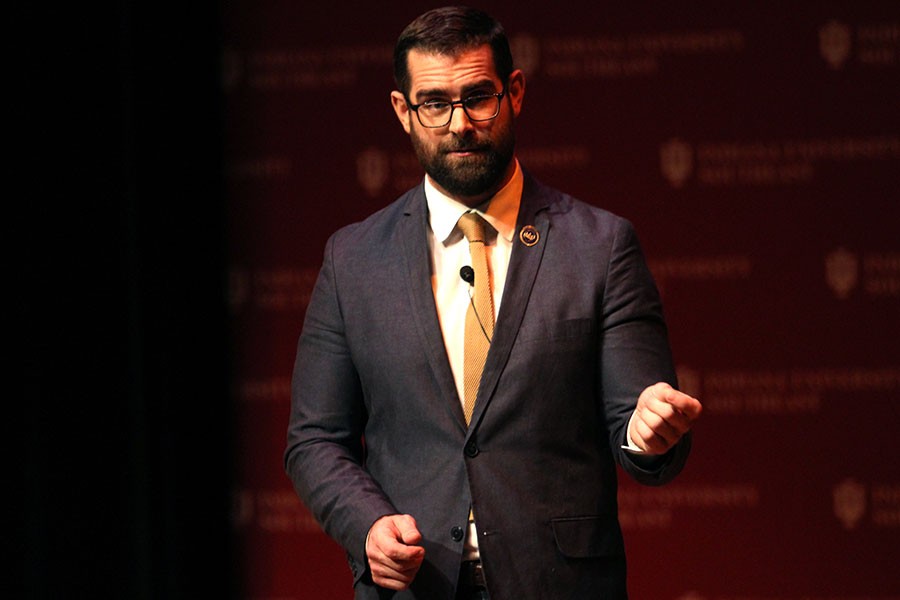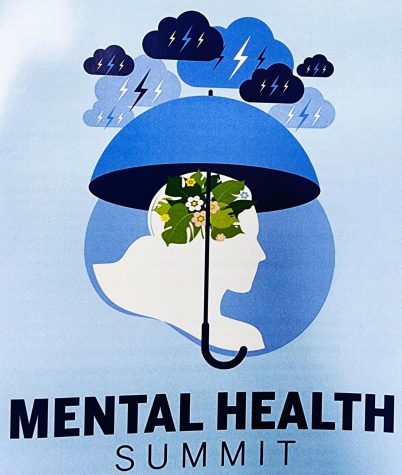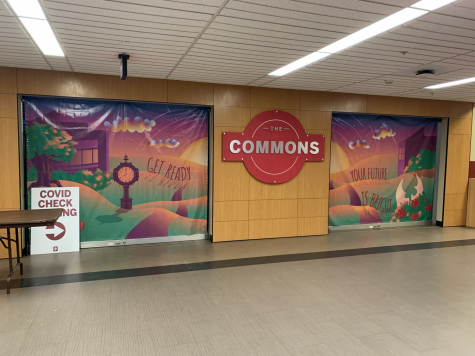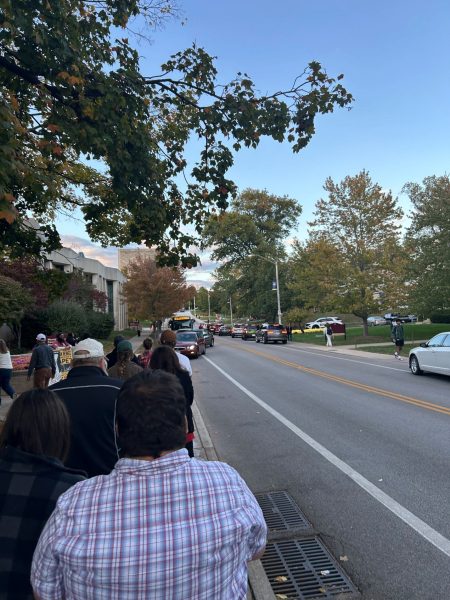Diversity advocate Brian Sims speaks in Ogle Center
Brian Sims was the keynote speaker in the Common Experience event “Decision Making and Diversity: Getting Things Done and Bringing People With You.”
Before Brian Sims was a diversity advocate or a Pennsylvania state representative, he had to come to terms with others knowing about his sexuality.
While Sims was a captain of his football team during his senior year at Bloomsburg University in Pennsylvania, one of his teammates walked up to him and asked if he was gay. Sims said yes, and gave permission for the rest of the team to know.
Sims said this made him the first openly gay football captain in NCAA history. He also said his teammates were supportive, and he realized they were unexpected allies in his journey and fight for social justice.
Sims spoke to IUS students, faculty, staff and community members on Thursday, March 17 as part of the Common Experience’s event called “Decision Making and Diversity: Getting Things Done and Bringing People With You.” The event lasted from 7 to 9 p.m. in Stem Concert Hall in the Ogle Center.
Veronica Medina, assistant professor of sociology and co-director of the Common Experience, said Sims’ speech was live-streamed to the other IU campuses.
She thanked University Information Technology Services for making the live stream possible.
Medina introduced Nicholas Moore, business junior and vice president of the Gay-Straight Alliance.
“Nicholas approached Common Experience over a year ago to suggest Rep. Sims as our keynote speaker, and he has been working very diligently ever since then to make sure that tonight’s event happened,” Medina said.
Moore said Sims’s visit to IU Southeast was significant for him because a team of sponsors and others enabled his visit to happen.
Moore said several IU Southeast departments sponsored the event, including the Student Program Council, the Office of the Chancellor, the Common Experience program, the School of Business, the Division of Enrollment Management and Student Affairs, the Academy of Diversity and Inclusive Education, Campus Life, the IUS Athletics Department, the Office of Residence Life and Housing, the School of Arts and Letters, the Career Development Center and the IUS Bookstore.
The Office of the Vice President for Diversity, Equity and Multicultural Affairs in IU Bloomington, the IU GLBT (Gay Lesbian Bisexual Transgender) Alumni Association and the Louisville Orchestra also sponsored Sims’s visit, Moore said.
Moore said he was grateful to the departments and organizations that supported Sims’s visit.
“I began planning this event two years ago,” Moore said. “I really began fundraising in earnest one year ago, and the yeses just kept on coming. And it really was a great thing. Whether it was sponsorships or IT or marketing, everybody just came to the table and said, ‘Alright, let’s see what we can do.’”
Moore said he saw Sims speaking in a video on Facebook two years ago, an experience he describes as incredible.
“I was blown away by how engaging and authentic and articulate he was in his message. So much so that it inspired me to work throughout the state of Indiana and the IU System to get him here for you tonight.”
The speech
After introductions, Sims took the stage. He thanked the Common Experience program and the GSA and provided some background information about his life.
“My parents both met in Vietnam,” Sims said. “My father was drafted, and my mom enlisted. They met in Vietnam and built a life together, and as army people do, they planned their kids out perfectly.”
As a result of his parents being in the Army, Sims said his family frequently moved and by the time his parents had retired from the Pentagon, he was in the eighth grade and had lived in 17 different states. Ultimately, his family settled in Pennsylvania, and he was recruited to play football at his school.
“In Pennsylvania, in eighth grade, when you were this size, they make you a football player whether you want to be one or not,” he said. “And so, one day, walking down the hall as the chubby dude, I got drafted to be a football player. At the time, I didn’t realize how much of an impact it was going to have on my life. And it ended up being very much a part of the driving force in who I am and how I approach people.”
Sims said his football career eventually took him to Bloomsburg University. In his senior year, his football team made it to the NCAA Division II National Championship.
“Going to this national championship was, for many of my teammates and certainly for me at the time, the biggest thing that had ever happened to any of us,” Sims said.
Sims’ speech mainly focused on diversity and equality. He said college-aged people in the U.S. are progressive and liberal when it comes to issues like LGBT equality, women’s rights, reproductive rights, racial and ethnic justice, immigration and federal funding.
Sims said he believes African-American women are the most progressive voters in America right now, because he believes they’re more likely to spend more time studying how they will be impacted and how the community will be impacted by her vote.
“I jokingly say, but I honestly wish it were true, that all of our legislatures were just populated by African-American women between the ages of 25 and 35,” Sims said. “I promise you our country would actually behave like a country most of us hope to be living in and has been promised to us.”
When voting on bills, Sims puts himself in others’ shoes, he said. He also said he will vote on 2,000 bills this year in the Pennsylvania legislature.
“Maybe 50 of them have ever had a direct impact on my life or will have direct impact on my life, where I can look at my normal life experiences while I’m determining how I want to vote on that bill,” Sims said. “Essentially what I’d be [doing] is put yourself in someone else’s shoes when making a determination, which I have to do for all of the other bills I have to vote on. I can put myself in somebody else’s shoes and determine how to impact.”
Additionally, Sims said it’s important for people to advocate for diversity by being an unexpected ally for someone.
“My charge to all of you is to be the unexpected ally to somebody that just does not think that you’d care, who doesn’t think you’re already in support of them,” Sims said. “Because they had never asked you if you were an ally, or you had never had a reason to show support for them. I promise you that the single most important thing that you all can do to promote diversity and to show and sort of model diversity is to ally ourselves with people who aren’t just like us. It sends a message that you’re a person of character.”
Questions and answers
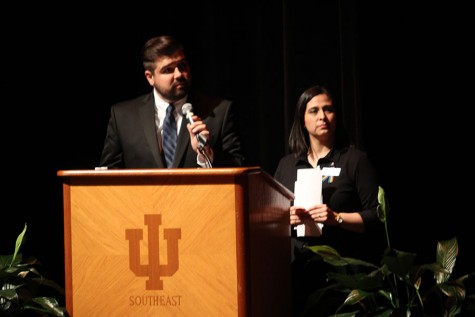
Sims said attendees and live stream viewers could tweet questions to the Common Experience’s Twitter account, @common_ius.
After his speech, he answered some of the questions on the account, as well as other questions from audience members.
On Twitter, Joe Glover, director of athletics and interim director of marketing and communications, asked Sims, “How can coaches and athletic administrators best encourage being inclusive and open up to their student athletes?”
Sims said coaches should not use old-school techniques and examples, because he believes several old-school models use shame to motivate people. He also said coaches, as well as teachers, should use diverse people in their examples.
Craig Sherman, a community member who attended the event, said he revealed that he is gay about four years ago. Sherman emphasized Sims’ point that people who are LGBT should get involved in their communities.
“Just get involved and let the world see how you are so special and an individual, not that you’re gay,” Sherman said. “You’d be amazed. I had never thought we’d be where we are today, but it’s people like him that made a difference. You can be a difference. So I challenge you. Just get involved in so many things, and you will be surprised by what the outcome is.”
Sims responded by saying everyone has a closet: some aspect of themselves that they are uncomfortable sharing with other people. He said it’s important for people to be authentic by revealing those aspects of themselves.
“In real life, standing up, proclaiming to people who you are — good, bad and ugly — makes people feel like they understand you better,” Sims said. “When they understand you better, they are more capable of respecting you.”
Audience viewpoints
Valerie Scott, senior lecturer of psychology, said she found Sims’ speech enlightening and refreshing.
Scott said that she liked that Sims brought up the benefit of having opposing sides. She said instead of bashing each other we can learn and grow from each other’s differences.
Michael Gardener, business junior and treasurer of the GSA, said he could listen to Sims talk all day, and he wished the event was longer.
Gardener also said he felt a lot of pride in the university because the event was supported so heavily.
Brandon Fischer, sociology senior, said he originally came to the event to volunteer, but after finding out that there were plenty of volunteers, he decided to stay and watch Sims speak.
Fischer said he liked that Sims acknowledged the world is a lot more diverse than some people think it is, and he walked away from his Sims’ speech feeling hopeful. He said even though he considers himself a diverse person in his own right, there is still a lot to experience and feel.
Matthew McClellan, Spanish freshman, said he liked that Sims said people should be allies for others.
“I really like the parts where he talked about being that advocate and that ally, and not being silent because you think other people are going to shoot you down automatically,” McClellan said. “The reality is, you’re in the majority. You’re not alone. And I think that’s a big key for a lot of people to understand if we’re going to become more unified as a sense of a student body and a sense of a community and a sense of a national thing, especially at a time like this where the political races are causing a lot of division, not just between two major factions, but among all parties. I think this was a really key moment to say that, to show that we’re not alone, even though we think we’re so dissimilar, that we can get along.”
Travis Huntley, police officer at IUS Police, said he was glad Sims spoke at IU Southeast because it shows the university values diversity.
“I think it’s good to us to have stuff like this so the community and the students as a whole understand that this campus embraces that attitude,” Huntley said. “I think it’s important for future enrollment.”
Interview with Sims
In an interview before his speech, Sims said he is frequently asked what it was like coming out to a college football team and Army parents.
Sims said his parents were very accepting when he came out.
“I come from a colorful and quirky family,” Sims said. “I think they just felt like this added to the color of our family.”
Sims said he believes part of the reason his parents were so understanding was because they were educated and had traveled as part of the army. He also said they were in a good demographic to handle him coming out.
“It just wasn’t an issue for them,” Sims said.
Sims said while his twin brother had probably already heard, he was one of the last people he sat down and formally came out to.
According to Sims, being a Democrat is a bigger issue to his extended family than his sexuality. Sims said his parents were Republicans while he was growing up, but his dad became a Democrat shortly after he came out.
“My dad sat me down and said, ‘Brian, I don’t think I can vote for a party that thinks of one of my sons as less valuable than the others,’” Sims said.
Meanwhile, Sims said he knew his whole life he wanted to be a lawyer.
“If you would have asked me when I was a little kid I would have said I want to be a feminist lawyer,” Sims said. “I knew as a little kid women weren’t treated the way they were supposed to be.”
Sims said he took his entrance exam to law school when he was 16, before he considered getting into politics in his mid-twenties by advocating for members of the LGBT community who were running for office.
Sims said Pennsylvania did not have any civil rights for LGBT people, and he thought he could do better for the community.
“I ran against an incumbent and beat her in 2012,” Sims said.
Sims said that, at the time, Pennsylvania needed to elect someone that was openly gay.
Sims said Pennsylvania was the second-largest state that had not elected someone who was openly gay.
“Every major women’s rights bill in Pennsylvania is my bill,” Sims said. “I think the opportunities that equality presents are great for all of us.”
Sims said he grew up in a co-equal household, where the treatment and the expectations of men and women were the same and people of color were not treated as less than.
“When you live in a place where everyone’s differences are celebrated instead of castigated, it really allows people to thrive,” said Sims. “When you let that happen that will benefit all of us.”
Sims said everyone performs better when they are respected and protected.
“When we are all performing, we are all unstoppable,” Sims said.
Common Experience
Several students involved in the Common Experience program volunteered at the event. Tessa Arnold, elementary education freshman and member of Phi Sigma Sigma, was one of those volunteers.
Arnold said she believed Sims’s speech would help the GSA gain exposure in the local community.
Aubrey Garman, psychology and sociology senior, also volunteered by counting how many people attended Sims’ speech.
The number ended up being around 100 people which she said she believed was a good turnout.
“We don’t know how many were watching on the stream with Twitter, which I think is such a cool, innovative way to use technology to reach people you may not be able to get here on campus,” Garman said. “But I thought it was a really great turnout and a really diverse turnout. Not just in orientation, but also in race and gender and age.”
Garman said she thinks the Common Experience program offers high-quality events and that the program is an asset to IU Southeast and the community because it creates diverse conversations and allows people to share their ideas and experiences.
Medina said the Common Experience program helped provide a platform for Sims to speak on campus.
“This is a diverse society, and so our theme this year was ‘Building Communities in a Global Society,’” Medina said. “And we think that Rep. Sims really delivers a message about building community. So we wanted to give him a platform to be able to bring that message to our students.”
Garman said she believes more students should attend events like Sims’ speech.
“I think students really need to continue to become engaged in these types of opportunities,” Garman said. “They’re so important to just expanding your knowledge and expanding your experience and getting a really true unique opportunity of being a college student on a campus that’s open to diversity.”
Note: This story was updated from the print version — which will appear in the March 21 issue — to include more quotes from Sims and attendees, as well as information from Sims’ speech.

